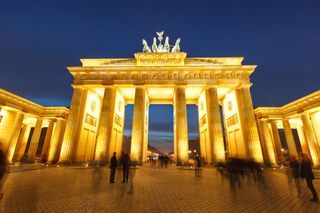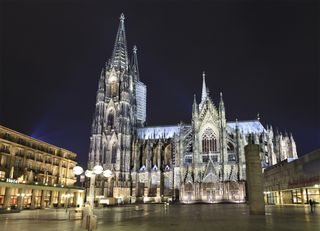German Culture: Facts, Customs and Traditions
Germany is at the center of Europe, not only geographically, but also in terms of politics and economics. The country is Europe's second most populous after Russia, with more than 80 million people, according to the World Factbook. The German economy is the largest on the continent and the fifth largest in the world.
While German exerts its influence on the countries that border it — Austria, Belgium, Czech Republic, Denmark, France, Luxembourg, Netherlands, Switzerland and Poland — all of these cultures have, in varying degrees, had a hand in shaping today's Germany.
The population is 91.5 percent German, with Turkish being the second largest ethnic group at 2.4 percent, according to the World Factbook. The remaining 6.1 percent is made up primarily of those of Greek, Russian, Italian, Polish, Serbo-Croatian and Spanish descent. About 75.7 percent of the population is urban.
Values
Germans place a high priority on structure, privacy and punctuality. The German people embrace the values of thriftiness, hard work and industriousness and there is great emphasis on making sure that "the trains run on time." According to Passport to Trade 2.0, an online business etiquette guide by the University of Salford in Manchester, England, "Germans are most comfortable when they can organize and compartmentalize their world into controllable units. Time, therefore, is managed carefully, and calendars, schedules and agendas must be respected."
Germans are stoic people who strive for perfectionism and precision in all aspects of their lives. They do not admit faults, even jokingly, and rarely hand out compliments. At first their attitude may seem unfriendly, but there is a keen sense of community and social conscience and a desire to belong.
Languages
Unsurprisingly, the official language of the country is German. More than 95 percent of the population speaks German as their first language, according to Angelo State University's Center for International Studies. Other languages spoken include Serbian in eastern Germany; North and West Frisian, spoken around the Rhine estuary; and Danish, primarily spoken in the area along the Danish border. Romani, which is an indigenous language, Turkish and Kurdish are also spoken.
Religion
Christianity is the dominant religion, with 65 to 70 percent of the population identifying themselves as Christian. That number is 29 percent Catholics. Muslims make up 4.4 percent of the population, while 36 percent are unaffiliated or have a religion other than Christianity or Muslim.
German food and drink
Germans love rich, hearty cuisine, though each area of Germany has its own definition of what a traditional meal looks like.
Pork is the most consumed meat, according to the German Food Guide. Schweinshaxe (braised pork hock) and Saumagen (pork stomach) are a couple of traditional pork dishes.
Bratwurst, a form of sausage, is closely associated with German food. Cabbage, beets, and turnips are commonly incorporated into meals, as they are native to the region, and potatoes and sauerkraut are also stars of German cuisine.
Beer is the most popular alcoholic beverage, and the country is known as the birthplace of a number of beer varieties, including Pilsner, Weizenbier (wheat beer) and Alt. These beers were crafted according to Reinheitsgebot, or the "Purity Law," a 16th-century Bavarian law that decreed that beer could only be brewed from barley, hops and water, according to NPR. Brewers used the yeast available in the air. Brandy and schnapps are also favorite German alcoholic beverages.

The arts
Culture doesn't just refer to how people interact and look. "Culture also means refined intellectual, artistic and creative achievement, for example as in cultural knowledge, or a cultured person," Cristina De Rossi, an anthropologist at Barnet and Southgate College in London, told Live Science.
Germans have made tremendous contributions to classical music, and the traditions of famous German or Austrian composers such as Johann Sebastian Bach, Wolfgang Amadeus Mozart, Ludwig van Beethoven, Johannes Brahms, Richard Wagner and Gustav Mahler live on today.
With their penchant for precision and engineering, it is not surprising that Germans have a strong tradition of printmaking by woodcut and engraving. There is also a strong representation of all phases of architecture — including Romanesque, Gothic, Classicist, Baroque, Rococo and Renaissance — represented in cathedrals, castles and public buildings. One well-known example of classic German art is the Brandenburg Gate, a former city gate that is now used to symbolize Berlin's unity.
Business culture
The desire for orderliness spills over into the business life of Germans. Surprises and humor are not welcomed. Everything is carefully planned out and decided upon, with changes rarely occurring after an agreement is made, according to the German Business Culture Guide.
There is a high regard for engineers in German, as evidenced by the country's success in the automotive industry. Because of this high level of respect for hands-on expertise, companies tend to be headed by technical experts rather than lawyers or those with a financial background.
Workers at all levels are judged heavily on their competence and diligence, rather than interpersonal skills. Communication with co-workers as well as outsiders tends to be direct and not always diplomatic.

Holidays and celebrations
Germany celebrates many of the traditional Christian holidays, including Christmas and Easter. German Unification Day on October 3 marks the reuniting of East and West Germany and is the only federal holiday.
While the country's big beer bash is called "Oktoberfest," its starts each year on a Saturday in September and ends 16 to 18 days later, on the first Sunday in October. The tradition started in 1810, with the wedding of Crown Prince Ludwig of Bavaria to Princess Therese von Sachsen-Hildburghausen, according to the city of Munich.
Additional resources
Sign up for the Live Science daily newsletter now
Get the world’s most fascinating discoveries delivered straight to your inbox.
Kim Ann Zimmermann is a contributor to Live Science and sister site Space.com, writing mainly evergreen reference articles that provide background on myriad scientific topics, from astronauts to climate, and from culture to medicine. Her work can also be found in Business News Daily and KM World. She holds a bachelor’s degree in communications from Glassboro State College (now known as Rowan University) in New Jersey.
